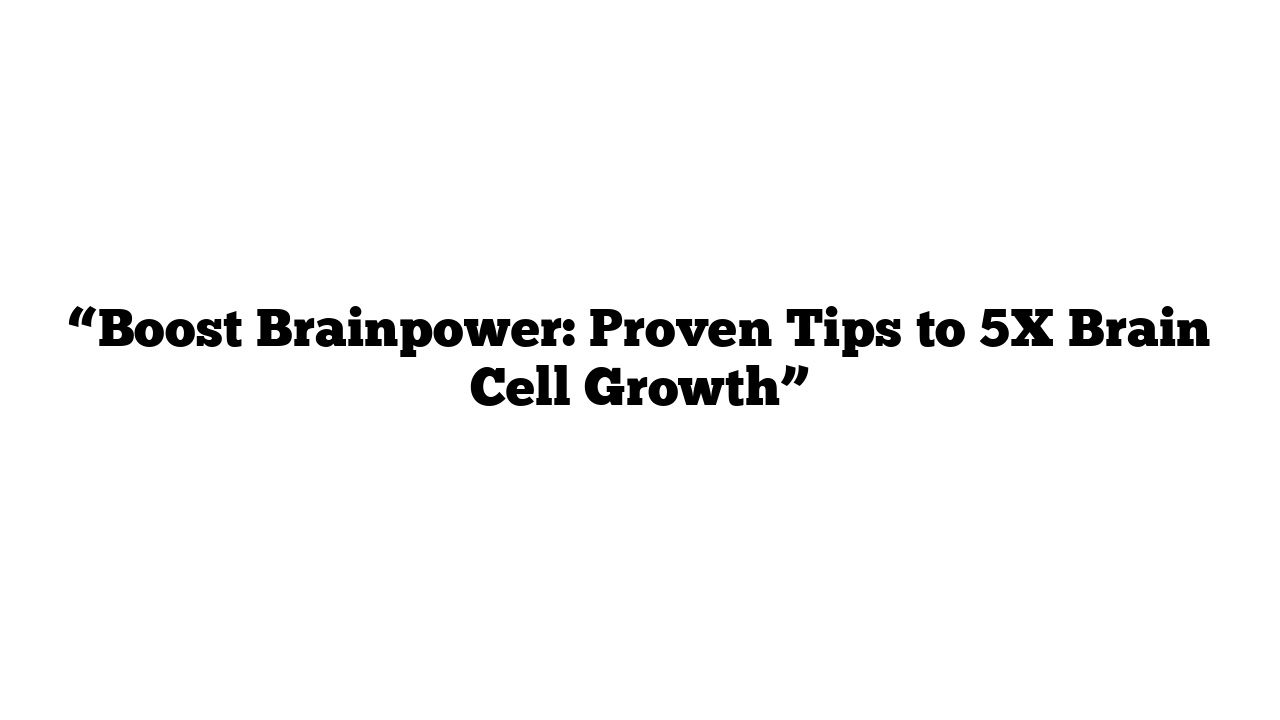Did you know that it’s possible to regenerate brain cells? Contrary to the old myth that brain cells can’t renew, research shows that your brain can indeed create new cells. The process of nerve regeneration, or neurogenesis, plays a vital role in keeping our brains sharp and our memory strong as we age. This article shares research-backed tips to help you multiply your brain cells by up to five times. Let’s dive into these science-supported strategies that can boost your brainpower and keep you mentally fit!
Understanding Neurogenesis
The term neurogenesis refers to the growth of new brain cells, specifically in the hippocampus, a part of the brain connected to memory, learning, and problem-solving. Neurogenesis has profound effects on brain health, impacting functions like spatial navigation (remembering layouts), object memory (like recalling where you placed your keys), and reasoning. While memory lapses are common, lifestyle choices greatly affect memory retention. Here’s how you can actively support neurogenesis.
1. Exercise: Keep Moving for Mental Health
Exercise tops the list of ways to boost brain health. Regular aerobic exercise like walking, running, or swimming significantly increases oxygen flow to the brain, helping prevent brain atrophy. Try mixing up aerobic activities with high-intensity interval training for an optimal impact on your brain’s health. Remember, inactivity can lead to cognitive decline, so staying active is key.
“Exercise is not just about physical health; it’s vital for cognitive wellness,” says Dr. John Doe.
2. Intermittent Fasting: A Powerful Brain Booster
Intermittent fasting (e.g., 16-18 hours of fasting or even a 23-hour fast once a week) has been shown to boost brain health. Periods without food stimulate the release of growth factors that support brain function and repair. By giving your brain cells a break from constant digestion, fasting may help to clear out damaged cells and allow new, healthier cells to thrive.
Tip: Start with a 16-hour fasting window if you’re new to intermittent fasting. Listen to your body and adjust as needed.
3. Cold Therapy: An Unexpected Ally
Cold therapy, like cold showers or ice baths, has been found to stimulate neurogenesis. For many, this practice is challenging, but it’s known to activate the body’s survival mechanisms, which in turn support brain cell regeneration. Give it a try—your brain may thank you!
4. Omega-3 Fatty Acids: Essential Brain Food
Omega-3 fatty acids, found in fish oils or cod liver oil, are crucial for brain health. DHA (a type of omega-3) is a building block of brain tissue, and regular intake has been linked to improved memory and cognition. Including omega-3-rich foods like salmon, sardines, and walnuts can greatly support your brain health.
Reference: For more on omega-3 Effect benefits, visit medicaltimes.io.
5. Avoid Processed Vegetable Oils
Refined oils (such as vegetable oils) are often heat-processed, resulting in oxidized oils that can be damaging to brain cells. Instead, opt for stable fats like coconut oil or butter for cooking. A low-carb diet also minimizes oxidative stress, which is beneficial for long-term brain health.
6. Focus on Ketogenic Foods
Switching to a low-carb, ketogenic diet can be beneficial for brain health, particularly for those prone to glucose imbalances. Ketones, an alternative brain fuel produced when carbs are low, bypass the damaged glucose metabolism pathways in the brain, offering a clean, efficient energy source.
7. The Benefits of Heat Therapy
While cold therapy has clear brain benefits, heat therapy through saunas or hot showers also offers supportive benefits. Heat exposure can help reduce stress and inflammation, both of which positively impact brain function.
8. Vitamins for Brain Health: B1 and Zinc
Vitamin B1 (Thiamine) is crucial for memory and cognitive health. A deficiency in B1 is linked to mental fatigue and memory problems. Zinc is another key mineral for the brain, especially in the hippocampus. A balanced diet rich in these nutrients can make a world of difference.
Foods high in B1: Whole grains, pork, fish, and nuts.
9. Probiotics: Support the Gut-Brain Connection
Your brain and gut are intricately connected. The gut microbiome produces neurotransmitters like serotonin, impacting mood, cognition, and even brain cell growth. Consuming foods rich in probiotics like yogurt, sauerkraut, and other fermented foods supports gut health and by extension, brain health.
Tip: Choose organic foods to avoid pesticides like glyphosate, which may disrupt the gut microbiome.
10. Sunlight and Vitamin D
Sunlight provides infrared energy, which can penetrate the skull and act as an antioxidant in the brain. It also boosts Vitamin D levels, important for cognitive health. Soaking up some sun daily can be a simple yet effective way to support brain function.
11. Plant-Based Nutrients
Plants are full of phytonutrients, compounds that help brain function. Turmeric (rich in curcumin), green tea, and foods high in quercetin provide protective benefits against inflammation and oxidative stress.
12. Choline: A Brain Cell Builder
Choline is essential for the production of acetylcholine, a neurotransmitter that impacts memory and learning. Foods like egg yolks, fish, and organ meats are high in choline and can help keep your brain healthy.
13. Quality Sleep: The Brain’s Nightly Detox
Getting quality sleep (not just quantity) is essential for brain regeneration. Poor sleep can impair neurogenesis and overall cognitive function. Aim for a calming bedtime routine to help ensure restful, uninterrupted sleep.
Moderation is key with caffeine: Too much can overstimulate the brain, but moderate amounts can be beneficial.
Wrapping Up: Choose What Works for You
Enhancing brain cell growth is more achievable than ever with these simple lifestyle adjustments. Start with one or two strategies and add more as you feel comfortable. Remember, you don’t need to do it all—just choose what fits best into your lifestyle. A little goes a long way when it comes to brain health.
For more science-backed health tips, visit medicaltimes.io.
